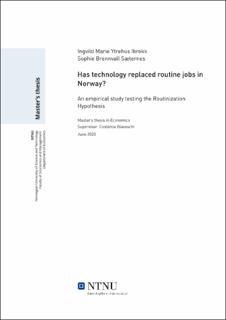| dc.contributor.advisor | Biavaschi, Costanza | |
| dc.contributor.author | Ibrekk, Ingvild Marie Ytrehus | |
| dc.contributor.author | Sæternes, Sophie Brennvall | |
| dc.date.accessioned | 2020-07-09T16:03:06Z | |
| dc.date.available | 2020-07-09T16:03:06Z | |
| dc.date.issued | 2020 | |
| dc.identifier.uri | https://hdl.handle.net/11250/2663617 | |
| dc.description.abstract | Formålet med denne oppgaven er å teste hvorvidt teknologi har erstattet typiske rutineoppgaver, i tillegg til å komplimentere de oppgavene som ikke er preget av rutine.
Ved å bruke data fra Arbeidskraftsundersøkelsen, kombinert med informasjon fra O*NET om hvilke typer arbeidsoppgaver ulike yrkesgrupper utfører, analyserer vi sysselsettingstrenden innenfor ulike arbeidsoppgaver i Norge i tidsperioden 1996-2018. Så vidt vi vet, er vi de første som tester rutiniseringshypotesen i Norge over de siste 20 år.
Vi tror denne oppgaven kan gi nyttig informasjon til myndighetene og beslutningstakere i Norge, med tanke på hvordan etterspørselen etter jobber og ferdigheter utvikler seg.
Vi analyserer trender for hele økonomien, i service- og produksjonssektoren, og for kjønn. I oppgaven finner vi bevis som støtter hypotesen i det første tiåret og mot slutten av vår tidsperiode. Vi ser en klarerer tendens til at teknologi erstatter manuelle rutineoppgaver, sammenlignet med kognitive rutineoppgaver. Våre funn indikerer at det er viktig å ta hensyn til andre faktorer som kan påvirke sysselsettingstrenden, for eksempel konjunktursvingninger i den norske økonomien. | |
| dc.description.abstract | This thesis test whether technology has substituted routine tasks and complemented high-skilled workers, looking at the Norwegian case during the period 1996-2018. Using information from the Norwegian Labour Force Survey, combined with information on occupational task characteristics from the O*NET database, we analyze employment trends using a task-based method. To the best of our knowledge, we provide first-evidence on the routinization hypothesis over the last twenty years in Norway. We believe this thesis could provide useful information to the government and policymakers in Norway, in regards to the future demand for jobs and skills. In addition to looking at the economy as a whole, we analyze the trends within the two sectors, manufacturing and services, as well as genders.
We find that the routine-biased technical change appears in the first decade, and then towards the end of our time period. The findings are more evident in routine manual tasks, whereas support for the routinization hypothesis is mostly absent in routine cognitive tasks. Our findings suggest that it is essential to take other considerations into account when exploring employment trends within tasks, including cyclical variations in the economy. | |
| dc.publisher | NTNU | |
| dc.title | Has technology replaced routine jobs in Norway? | |
| dc.type | Master thesis | |
